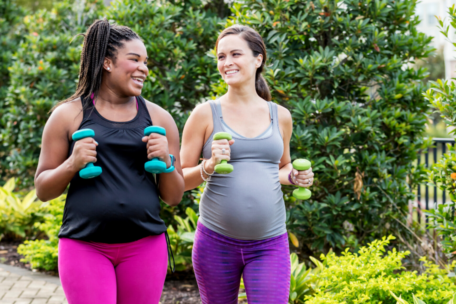Exercise during pregnancy: What you need to know
Exercise during pregnancy is associated with substantial health benefits including improvements in physical fitness and mental health, as well as decreased risk of chronic disease and mortality.
Pregnancy is a unique period of a woman’s life where lifestyle behaviours, including physical activity and exercise, can significantly affect her health, as well as that of her baby.
For most pregnant women, it is recommended to:
- Drink plenty of water and other fluids
- Ensure you always warm up and cool down properly
- When attending training classes, alert your trainer and ensure they are properly qualified to assist you
As your pregnancy progresses your body, you may have to modify or change how you exercise as your body changes. This may include avoiding activities that:
- Give you pain or discomfort
- Have a high risk of falling or collision
- Involve significant changes in pressure (e.g., scuba diving)
Please note before you proceed it is important to consult your doctor to ensure you select an exercise program that is suited to your individual needs, circumstances and relevant medical condition. A qualified physiotherapist can also help with exercise prescription.
What are the benefits of exercising during pregnancy?
Physical activity during pregnancy can have numerous benefits for both your physical and psychological health. These benefits include:
- Increased energy
- Improved circulation
- Improved posture
- Improved sleep and management of insomnia
- Decreased risk of back and pelvic pain
- Decreased risk of anxiety and depression
- Decreased risk of pregnancy complications (e.g., pre-eclampsia, pregnancy-induced hypertension etc.)
- Prevention and management of urinary incontinence
- Source of enjoyment and stress relief
- Shorten the duration of active labour
When should I stop exercising during pregnancy?
We recommend you stop exercising and contact your doctor immediately if you experience any of the following signs and symptoms:
- Chest pain
- Unexplained shortness of breath
- Dizziness, feeling faint or headaches
- Calf pain, swelling or redness
- Sudden swelling of the face, hands or ankles
- Pain, especially in your back, chests, stomach or pelvic area
- Vaginal bleeding
- Regular and painful contractions
- Changes in your baby’s usual movement pattern
Please consult your maternity team if you have any specific questions or queries regarding your individual exercise program.
What are tips for exercising during pregnancy?
- Stay hydrated with plenty of fluids
- Ensure you always warm up and cool down properly
- When attending training classes, alert your trainer and ensure they are properly qualified to assist you
- Listen to your body – if the exercise doesn’t feel right then stop
- Do not attempt exercise or training which you haven’t previously experienced or performed prior to pregnancy
- Consider a pelvic floor assessment by a qualified pelvic floor physiotherapist
- Employ a qualified doctor or exercise physiologist to support your training during pregnancy


